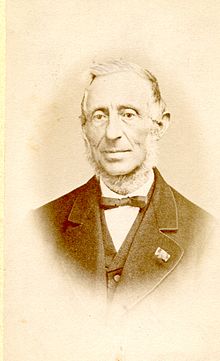
This article relies largely or entirely on a single source .(March 2015) |
Joseph Kehrein (1808-1876) was a German educator, philologist and historian of German literature.

This article relies largely or entirely on a single source .(March 2015) |
Joseph Kehrein (1808-1876) was a German educator, philologist and historian of German literature.
He was born at Heidesheim am Rhein, near Mainz on 20 October 1808. In 1823 he entered the gymnasium in connection with the diocesan seminary at Mainz, and after its suppression in 1829 he continued his classical studies at the state gymnasium of the same place, where he graduated in 1831.
After studying philology at the University of Giessen from 1831 to 1834, he taught at the gymnasium of Darmstadt, 1835–1837, at that of Mainz, 1837–1845, was prorector at the newly founded gymnasium of Hadamar in Nassau, 1845–1846, professor at the same place, 1846–1855, director of the Catholic teachers' seminary at Montabaur, 1855–1876, and at the same time director of the Realschule at the same place, 1855–1866.
He died at Montabaur in Hesse-Nassau on 25 March 1876.
He is the author of numerous works, chiefly on the German language, on the history of German literature and on pedagogy. The best known among them are:
He also edited Katholische Kirchenlieder aus den altesten deutschen Gesangbuchern (3 volumes, Würzburg, 1859–1865) and Lateinische Sequenzen des Mittelaters (Mainz, 1873).
![]() This article incorporates text from a publication now in the public domain : Herbermann, Charles, ed. (1913). "Joseph Kehrein". Catholic Encyclopedia . New York: Robert Appleton Company.
This article incorporates text from a publication now in the public domain : Herbermann, Charles, ed. (1913). "Joseph Kehrein". Catholic Encyclopedia . New York: Robert Appleton Company.

Georg Heinrich August Ewald was a German orientalist, Protestant theologian, and Biblical exegete. He studied at the University of Göttingen. In 1827 he became extraordinary professor there, in 1831 ordinary professor of theology, and in 1835 professor of oriental languages. In 1837, as a member of the Göttingen Seven, he lost his position at Göttingen on account of his protest against King Ernst August's abrogation of the liberal constitution, and became professor of theology at the University of Tübingen. In 1848, he returned to his old position at Göttingen. When Hanover was annexed by Prussia in 1866, Ewald became a defender of the rights of the ex-king. Among his chief works are: Complete Course on the Hebrew Language, The Poetical Books of the Old Testament, History of the People of Israel, and Antiquities of the People of Israel. Ewald represented the city of Hanover as a member of the Guelph faction in the North German and German Diets.
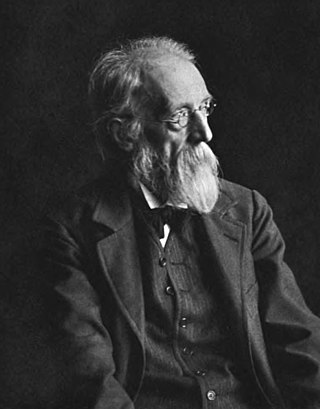
Theodor Nöldeke was a German orientalist and scholar, originally a student of Heinrich Ewald. He is one of the founders of the field of Quranic studies. His research interests ranged over Old Testament studies, Semitic languages and Arabic, Persian and Syriac literature. Nöldeke translated several important works of oriental literature and during his lifetime was considered an important orientalist. He wrote numerous studies and contributed articles to the Encyclopædia Britannica.
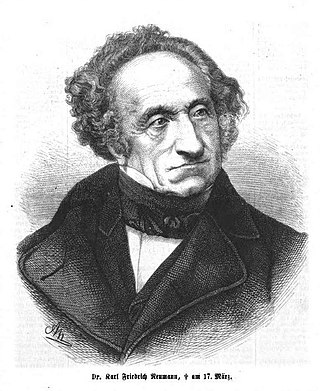
Karl Friedrich Neumann was a German orientalist.
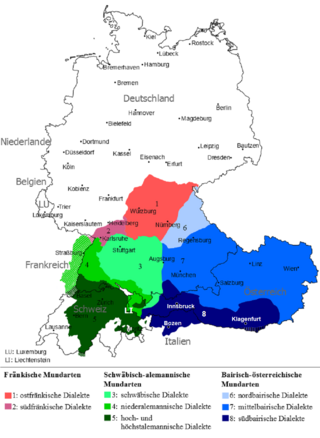
East Franconian or Mainfränkisch, usually referred to as Franconian in German, is a dialect which is spoken in Franconia, the northern part of the federal state of Bavaria and other areas in Germany around Nuremberg, Bamberg, Coburg, Würzburg, Hof, Bayreuth, Meiningen, Bad Mergentheim, and Crailsheim. The major subgroups are Unterostfränkisch, Oberostfränkisch and Südostfränkisch.

Hans Conon von der Gabelentz was a German politician who served as prime minister of the Duchy of Saxe-Altenburg from 1848 to 1849. He was also a gifted linguist and an authority on the Manchu language. He devised a standard romanized transliteration system for Manchu whose creation is often incorrectly credited to his compatriot Paul Georg von Möllendorff.
Ferdinand Janner was a German theologian.
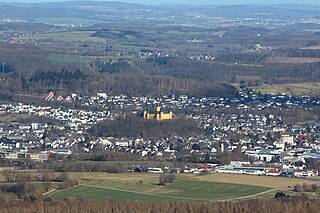
Montabaur is a town and the district seat of the Westerwaldkreis in Rhineland-Palatinate, Germany. At the same time, it is also the administrative centre of the Verbandsgemeinde of Montabaur – a kind of collective municipality – to which 24 other communities belong. The town is known throughout the country for its strikingly yellow castle and its InterCityExpress railway station on the Cologne-Frankfurt high-speed rail line.
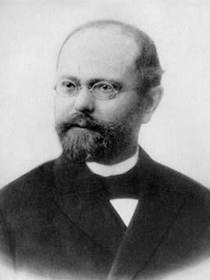
Hermann Otto Theodor Paul was a German philologist, linguist and lexicographer.

Isaac Jacob Schmidt was an Orientalist specializing in Mongolian and Tibetan. Schmidt was a Moravian missionary to the Kalmyks and devoted much of his labours to Bible translation.

Andreas Joseph Hofmann was a German philosopher and revolutionary active in the Republic of Mainz. As Chairman of the Rhenish-German National Convention, the earliest parliament in Germany based on the principle of popular sovereignty, he proclaimed the first republican state in Germany, the Rhenish-German Free State, on 18 March 1793. A strong supporter of the French Revolution, he argued for an accession of all German territory west of the Rhine to France and served in the administration of the department Mont-Tonnerre under the French Directory and the French Consulate.
Theodor Wilhelm Braune was a German philologist and Germanist.
Franz Philip Kaulen was a German Catholic scriptural scholar.

Franz Mone was a historian and archaeologist.
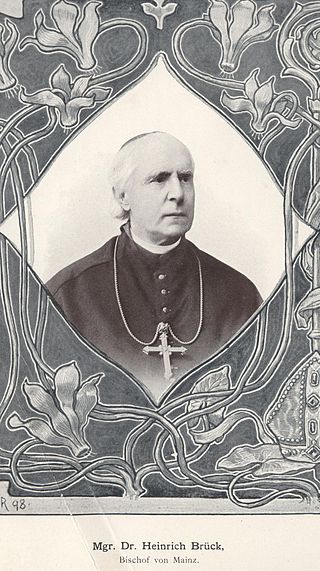
Heinrich Brück was a German Catholic church historian, and Bishop of Mainz.
Adolf Pfister was a German Roman Catholic priest and educator.
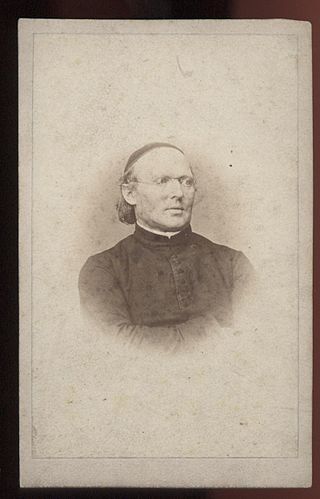
Wilhelm Molitor was a German poet, novelist, canon lawyer and publicist, and Roman Catholic priest. He was a chief promoter of the Catholic movement in the Palatinate.
Johann von Kelle was a German philologist who studied the German language.

Heinrich Bone was a German educator and hymnwriter. He wrote a reader for German studies which was used for higher education in Germany, Belgium, Luxembourg and Austria, until it was banned during the Kulturkampf. He published a hymnal, Cantate!, which was used by several Catholic dioceses and became a model for common hymnals. Some of his own hymns, including paraphrases of Latin hymns, are part of recent hymnals, both Catholic and Protestant, such as "Komm, Schöpfer Geist, kehr bei uns ein" as a paraphrase of the 9th-century hymn for Pentecost, Veni Creator Spiritus.
Karl Friedrich Wilhelm Wander was a German pedagogue and Germanist. He published the largest existing collection of German-language proverbs.
Anton Führer. was a German classicist who specialised in the language of Boeotia in Ancient Greece. He completed his dissertation De dialecto Boeotica at the University of Göttingen in 1876. As noted by Harry Falk (Indologist), he is not to be confused with Alois Anton Führer, the Indologist who studied Sanskrit at the University of Würzburg and had a controversial career in India. He was named an honorary citizen of the city of Rheine, and wrote a book about the city's history.